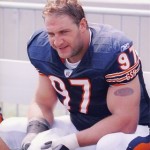Remember That Time Patriots Owner Robert Kraft Fired A Rapist Who Then Went to Play for the Giants?
As much as coaches and leagues (from the NCAA to NBA to NFL) like to talk about “character issues” and how they won’t be tolerated, that line of thinking RARELY trumps the desire to win. But sometimes we get a surprise. Every now and then someone stands up for the greater good. And in this story that person was New England Patriots owner Robert Kraft.
Natalie Tysdal, now a reporter for KDVR in Denver, came out last week and told the story of how a football player she met while in college tried to rape her. The guy, Christian Peter, had been rumored on campus to have raped or sexually assaulted other women on campus. Despite being arrested several times, charged with and CONVICTED OF third degree sexual assault (which includes rape) and sentenced to 18 months of probation, the University of Nebraska still allowed Peter to play. In fact, he ended up meeting the President when they won a national title.
Fast forward and Peter is drafted by the New England Patriots. But when owner Robert Kraft found out about Peter’s sordid sexual history (post-draft), he cut him from the team.
He cut Peter from the team just days after the draft. It was the first time in the league’s 75 year history that a player had been relinquished after the draft and before spring training. It was a move that spoke volumes and the man behind it was a rookie owner in the NFL. Successful and powerful in his own right, businessman and Patriots owner Robert Kraft made a statement that set off a firestorm in the New England area. Kraft said that Peter’s behavior was “incompatible with our organization’s standards of acceptable conduct.”
Recently, Tysdale got a chance to meet Robert Kraft and she retells the the story in this post (from which I grabbed the above quote). I think the story is worth reading, especially when she talks about how they both exchanged something meaningful with one another.
On Peter, other women over the years have come forward with their experiences with him. In 2004, Kathy Redmond who founded the National Coalition Against Violent Athletes told her story to The Globe.
Kathy Redmond still remembers Christian Peter’s eyes, nearly 13 years later. “I told him, `No,’ both nights, and it didn’t register,” she said. “His eyes were very predatory. Just blank. There was nothing there. I remember that vividly. Nothing behind those eyes. It’s like these terrorists, you wonder how they can do what they do. It’s just a lack of conscience.”
The 5-foot-2-inch, 120-pound Redmond, then 18, was enrolled at the University of Nebraska for just one week when she met the 6-2, 265-pound Peter, a nose tackle on the football team. She says Peter, who could bench-press 450 pounds, lured her to his room and raped her. The next day, she says, Peter pushed his way past dorm security and into her room, where he raped her again, this time with two of his teammates keeping watch.
Now it is Redmond who is keeping watch. She is the founder of the National Coalition Against Violent Athletes, a nonprofit watchdog group based in Colorado. Between the Kobe Bryant rape case and sexual-abuse scandals at the Air Force Academy and Colorado University, Redmond says she is at the epicenter of a “rape culture.”
Controversial and outspoken, Redmond has been hailed as a hero by some of the 250 women she has counseled. Others label her a liar, an egomaniac, and worse. She calls her detractors the “Good Ol’ Boys Club,” one that holds athletes accountable only on the playing field.
Ironically, it was not Peter but one of his New York Giants teammates that motivated Redmond to change her life. She created NCAVA after the suicide of a 22-year-old woman who said she was assaulted by Giants defensive back Tito Wooten.
One thing that is usually present in these sorts of discussions is the idea that athletes somehow are more likely to be rapists or violent in general. I don’t think that’s true. However, what makes athletes dangerous is the level of privilege they enjoy. I think we’ve seen with the Penn State case as well as others (even as of late) that often people will go to great lengths to save sports programs -even if that means hiding or enabling someone who is dangerous. In this sense, athletes enjoy an even greater ability to get away with crimes, in particular, crimes against women and children.
For Peter’s part, he said the Patriots (if not Kraft) knew his rap sheet and had discussed it with him before the draft. Sports Illustrated’s Peter King wrote at the time that the Patriots “fumbled” the Peters pick. Part of the implication was that issues with errors in the background investigation into Warren Sapp prior to him being drafted led to a reduction in information provided to teams. Once Peter was cleared the NY Giants picked him up and apparently made him promise to submit to regular counseling for anger and alcoholism with then team psychiatrist Dr. Joel Goldberg.
Peters spent 6 years in the NFL playing for the Giants, Chicago Bears and Indianapolis Colts.
A video of Peters posted without comment.







